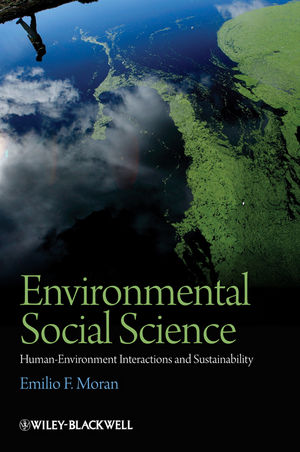Environmental Social Science: Human - Environment interactions and SustainabilityISBN: 978-1-4051-0573-6
Hardcover
232 pages
February 2010, Wiley-Blackwell
 This is a Print-on-Demand title. It will be printed specifically to fill your order. Please allow an additional 15-20 days delivery time. The book is not returnable.
Other Available Formats: Paperback
|
||||||
1. The Challenge of Human-Environment Interactions Research.
The Evolution of Social Ecological Systems.
Characterization of Contemporary Global Environmental Changes.
History of the Development of the Human Dimensions Agenda.
Characteristics of the Research on the Human Dimensions.
The Way Forward: Integrative Science.
2. Theories and Concepts from the Social Sciences.
Population, Technology and Central Place Theories .
Population and Environment Theories.
Agency and History.
Decision-theoretic Approaches.
Political Economy and Political Ecology.
Cultural Ecology.
3. Theories and Concepts from the Biological Sciences.
Evolution by Natural Selection.
Species respond individualistically, not as communities, to environmental change.
Interactions with other species help determine if a particular species will persist in a particular place (Niche and Neutral Theories).
Top-down vs. bottom-up control in ecosystems.
Succession.
Island Biogeography.
Equilibrium/non-equilibrium theories of competition, coexistence, community composition
Biodiversity and ecosystem processes/services.
The Ecosystem Concept in Biology and the Social Sciences.
4. Spatially-Explicit Approaches.
Remote Sensing and GIS.
A Case Study using GIS/ Remote Sensing to study Amazonian Deforestation.
Urban-rural spatial dynamics.
Modeling and GIS.
5. Multi-Scale and Multi-temporal Analysis.
An approach to multi-disciplinary, multi-scale research.
Scale.
Local level of analysis.
Regional Level of Analysis.
Global Level of Analysis.
Future Directions.
6. Bio-complexity in Ecological Systems.
Spatially-explicit Processes in Ecological and Social Systems.
Agent-Based Modeling of Complex Systems.
Hierarchical Modeling.
Conclusions.
7. Environmental Decision-Making.
Institutional Analysis.
Individual Behavior and Environmental Decisions.
Decisions and Social Context.
Conclusions.
8. Towards Sustainability Science.
Sustainability Science Research Priorities.
Scales of Sustainability.
Cities and Sustainability Science.
Climate Change and Sustainability.
Conclusions.
Bibliography.



